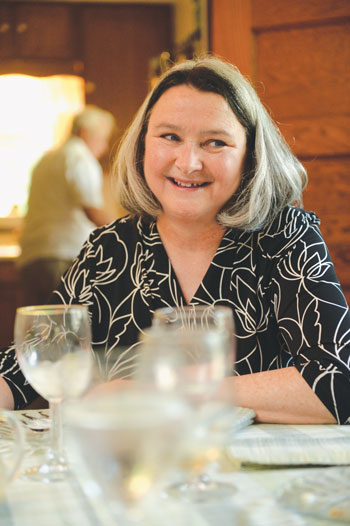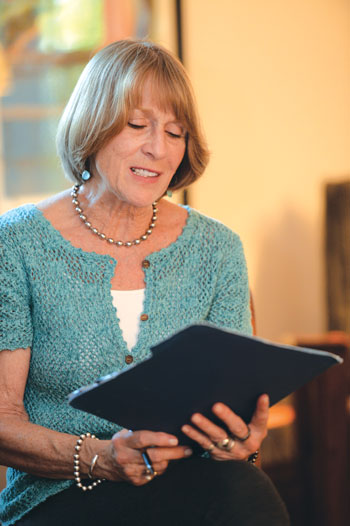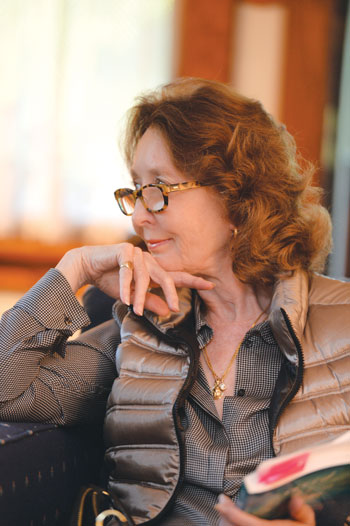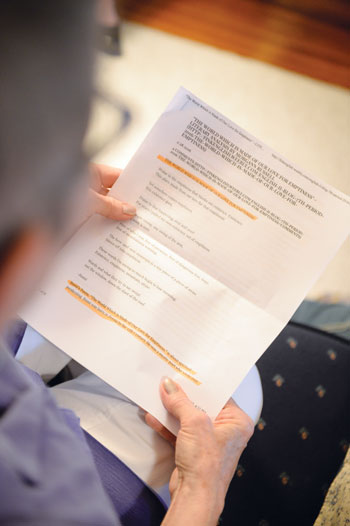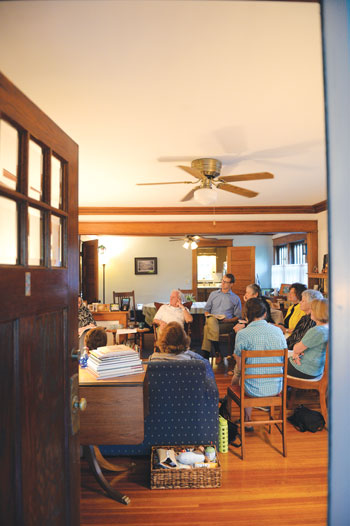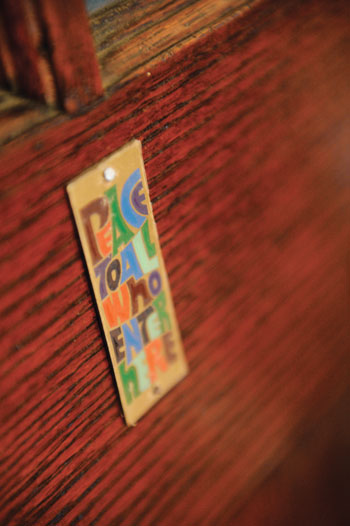Writer: Jane Schorer Meisner
Photographer: Duane Tinkey
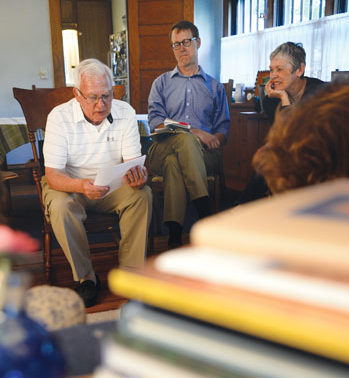
Many days, children’s voices waft from a nearby schoolyard to the 101-year-old Des Moines home of John Zeitler and his wife, Carmen Lampe-Zeitler. Varnished wooden floors grace the aging house, where built-in sideboards line a dining room wall, and—once a month—the unassuming living room transforms into a poetry salon.
A salon, in historic context, is a gathering to discuss aspects of culture and the arts. In the Zeitler home, that usually means eight to 10 (sometimes as many as 18) friends who look forward to conversations about poetry.
“I call our group ‘the Poetry Gathering,’ ” Carmen says. “Others call it a ‘salon.’ Mostly, when others refer to it, they say, ‘I’ll see you at Poetry.’ ”
The gatherings began in 2007, when Carmen and a friend, Mary Kay Casey, discovered a mutual admiration of poet Mary Oliver. “We were always joking that we should start a Mary Oliver fan club,” Carmen says. Eventually, they expanded their discussion to include other poets—and other poetry lovers: “She invited a few people, we invited a few people, and those people invited people.”
Casey now lives in Denver and says she desperately misses the Poetry Gathering.
“Poetry—even a line or two—can capture an experience or give words to a feeling that a person may not have words for,” she says.
The Poetry Gathering has a laid-back format, John says. He and Carmen host a meal before settling in to read poetry. “There’s no order to it,” he says. “People may read something that they really like. Sometimes people write their own poetry, and someone might make a comment or observation about it.”
Carmen says their focus is on appreciation of poetry, rather than analysis. They want to avoid what poet Billy Collins describes in “Introduction to Poetry”:
I want them to waterski
across the surface of a poem
waving at the author’s name on the shore.
But all they want to do
is tie the poem to a chair with rope
and torture a confession out of it.
They begin beating it with a hose
to find out what it really means.
Poetry and Social Activism
The Zeitlers, who married in 1995, are social activists who say poetry often dovetails with public causes and politics, from Bob Dylan’s lyrics to the rap of “Hamilton.”
Carmen, 62, is a Baptist minister who served seven years as pastor of a congregation in Mount Ayr. Last fall, she ended a 20-year stint as executive director of Children and Family Urban Movement and now is “taking a hiatus,” she says, while writing children’s books.
She became fascinated with poetry during high school in Mount Pleasant. Years later, she was inspired by the Rev. Frederick J. Streets, the first African-American chaplain at Yale University. “He told how he had to memorize a poem in sixth grade, and his worldview was changed by that poem,” she says.
John, 77, was required to memorize poetry as a young student in Pennsylvania. A retired social worker, he moved to Iowa during his 26 years as a Catholic priest. He served several parishes in southern Iowa before spending the last five years of his priesthood at a Catholic mission in Tanzania.
His priorities now, he says, are opposing Trump administration policies, supporting refugees and protecting the ecology. He admires the work of Chilean poet and diplomat Pablo Neruda, who received the 1971 Nobel Prize in Literature two years before his death at age 69.
“Neruda was well-recognized when the right-wing government took over,” John says. “They were out to get rid of him. But the whole time he was running, he was writing resistance poetry. And the people were wild about it. His poetry was a great source of strength for the people who were resisting the far right government.”
A ‘Generous Ritual’
Still, members of the Poetry Gathering describe it mostly as a source of tranquility.
Judy Conlin calls it “a respite,” an evening that takes her away from the everyday world.
“It is the warmth of Carmen and John’s hospitality that enhances the evening,” says the retired executive director of the Iowa International Center, who has attended the Poetry Gathering since its inception. “It is a rare home where there is always another place at the table.”
Longtime member Kathleen Murrin of Des Moines says poetry is “good for the soul—and good for my sense of self, sanity and security.” But for her, the group delivers more than just poetry.
“For me, it is about relationships and a deepening appreciation and affection for the members of the group,” she says. “It’s about knowing each other through the poetry we share [and] how we share it.”
Freelance writer Rebecca Christian belonged to the group for a decade before moving to Ames and becoming a less frequent attendee. “It is a lovely little oasis of calm, civility and humor to look forward to every month,” she says. “Even though we never assign a topic, there often ends up being a theme throughout the poems people bring to share.”
Christian says Carmen and John’s “little jewel box
of a home is one of the most welcoming places I’ve ever been. To have hosted something like this once a month for many years—always providing a simple and delicious supper first and welcoming all comers who love poetry—is one of the most generous rituals I’ve ever had the honor of partaking in.”


